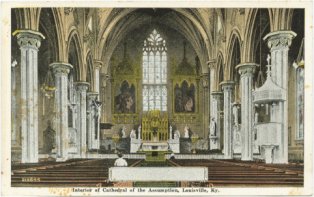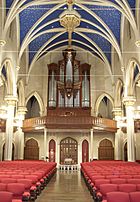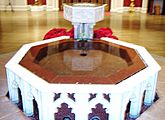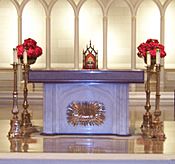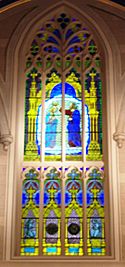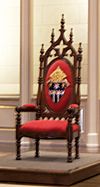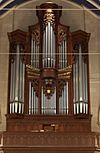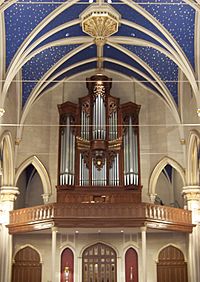Cathedral of the Assumption (Louisville, Kentucky) facts for kids
Quick facts for kids |
|
|
Cathedral of the Assumption
|
|
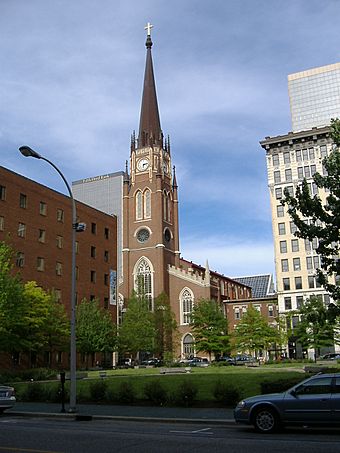 |
|
| Location | Louisville, Kentucky |
|---|---|
| Built | 1852 |
| Architect | William Keely; D.X. Murphy & Bros |
| Architectural style | Gothic Revival |
| NRHP reference No. | 77000623 |
| Added to NRHP | September 21, 1977 |
The Cathedral of the Assumption is a large and historic Catholic cathedral located in Louisville, Kentucky. It is the mother church, or main church, of the Archdiocese of Louisville. This means it is the home church for the archbishop of the region. The cathedral is the official seat of Archbishop Shelton J. Fabre. The priest in charge of running the cathedral is called the rector.
Contents
History of the Cathedral
The First Church on the Site
In 1811, a small group of Catholics in Louisville started a church called Saint Louis Church. The first priest to serve the area was Fr. Stephen Badin, who was known as a "circuit rider priest" because he traveled all over the American frontier.
By 1830, the community had grown, and they built a larger Saint Louis Church on Fifth Street. This is the same spot where the Cathedral of the Assumption stands today.
Building a New Cathedral
The main Catholic district, or diocese, was originally in Bardstown, Kentucky. In 1841, the diocese moved to Louisville, and Saint Louis Church became Saint Louis Cathedral. The bishop at the time, Bishop Benedict Joseph Flaget, decided a grander cathedral was needed.
Work on the new cathedral began in 1849. Sadly, Bishop Flaget died in 1850 before it was finished. His body now rests in a chapel underneath the cathedral. The next bishop, Martin John Spalding, completed the project.
On October 3, 1852, the new church was dedicated as the Cathedral of the Assumption. It was built in a very clever way. The new, larger cathedral was constructed around the old St. Louis Church. Once the new building was complete, the old church was taken apart piece by piece and carried out the front doors.
A Time of Trouble
Soon after it was built, the cathedral was almost destroyed. On August 6, 1855, a day that became known as Bloody Monday, there was serious conflict in Louisville. Some people were spreading fear and untrue rumors about new immigrants from Germany and Ireland.
This led to violence in the city. Some people wrongly believed that weapons were being stored in the basements of the cathedral and another new church. They threatened to burn the churches down. Luckily, the mayor of Louisville, John Barbee, inspected the buildings. He confirmed there were no weapons, and the cathedral was saved.
Restoring the Cathedral
Over the years, the cathedral needed repairs. In the 1980s, a major effort began to restore the cathedral and make it a spiritual center for the whole city.
Starting in 1988, a big renovation project began. The spire on top of the tower was repaired. The undercroft, a room beneath the church that had not been used for 100 years, was completely restored and reopened in 1991.
From 1993 to 1994, the main part of the cathedral was renovated. In 1998, the bell tower and spire were fully restored, making the cathedral look grand once again.
Inside the Cathedral
The cathedral is known for its beautiful architecture and art. It was built in the Gothic Revival style, which is meant to look like the great cathedrals of the Middle Ages in Europe.
During a renovation, the walls were painted to look like they are made of stone blocks. The painting is so realistic that many visitors are surprised to learn it's not real stone.
The main body of the church is called the nave. It can hold 966 people. Instead of fixed benches, or pews, the cathedral uses individual chairs. This allows the seating to be rearranged for special services, like those during Holy Week.
The Baptistry
The baptistry is where people are baptized to become members of the church. It has a large pool for baptism by immersion (going fully into the water) and a font for infusion (pouring water over the head). The pool is made of red granite and marble from the church's original Communion rail.
The Altar
The altar is the table at the front of the church where the most important parts of the Mass take place. It is made of gray marble from the original high altar and red granite that matches the baptistry pool. A brass symbol of a lamb, known as the Agnus Dei (Latin for "Lamb of God"), is on the altar. It represents Jesus.
The Coronation Window
One of the most stunning features of the cathedral is the Coronation Window. This large stained glass window was made in 1883 and is one of the oldest American-made stained glass windows. It shows the Virgin Mary being crowned as the Queen of Heaven. According to Catholic belief, after Mary's life on Earth, Jesus took her body into heaven, an event called the Assumption.
The Cathedra
The cathedra is the official chair of the Archbishop. The word "cathedral" actually comes from the Latin word cathedra, which means "chair." This special chair is a symbol of the bishop's role as a teacher and leader. The coat of arms of the Archdiocese of Louisville is painted on the back.
The Organ
Above the entrance is a large pipe organ built in 1983. It has three keyboards, called manuals, and thousands of pipes. The case for the organ is made of hand-carved mahogany. The powerful sound of the organ fills the cathedral during services and concerts.
The Cathedral in the Community
The Cathedral of the Assumption does more than just hold church services. It is very active in helping the people of Louisville.
- Helping the Homeless: A daily lunch program serves about 125 homeless people every day.
- Community Support: The cathedral works with organizations that help people find jobs, provide shelter, and assist families in need.
- Working with Other Faiths: The cathedral has a special relationship with the nearby Christ Church Episcopal Cathedral. They hold joint services to show unity and friendship between different Christian groups.
- Sister Parish: The cathedral has a "sister parish" relationship with a church in Jérémie, Haiti. They support each other through prayer and sharing resources.
Music at the Cathedral
Music is a very important part of life at the cathedral. The cathedral choirs are made up of talented volunteers who sing a wide range of music, from ancient chants to modern pieces. The choirs have even toured Europe, singing in famous churches in England and Ireland.
The cathedral also has a carillon, which is a set of tuned bells in the tower that can be played like an instrument.
See also
 In Spanish: Catedral de la Asunción (Louisville) para niños
In Spanish: Catedral de la Asunción (Louisville) para niños
- Basilica of St. Joseph Proto-Cathedral
- List of Catholic cathedrals in the United States
- List of cathedrals in the United States
- List of attractions and events in the Louisville metropolitan area
- National Register of Historic Places listings in Downtown Louisville, Kentucky
- Religion in Louisville, Kentucky


